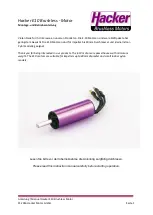
Operation Manual / 4 Product description / A100-M axial
1 Introduction / 1.4 Layout and function of the turbocharger
© Copyright 2017 ABB. All rights reserved.
HZTL4033_DE
Revision B
December 2017
Mode of operation
The turbocharger is a turbomachine and consists of the main components turbine and com-
pressor. These components are installed on a common shaft and form the rotor.
In the turbocharger shown in the illustration
(see Fig. 1: Layout and function
haust gas flows through the gas inlet casing (06) and the nozzle ring (07) and then reaches
the turbine (08). The turbine uses the energy contained in the exhaust gas to drive the rotor.
The exhaust gases then reach the atmosphere through the gas outlet casing (05) and the ex-
haust gas pipe connected to it.
The rotor runs in two radial plain bearings, which are located in the bearing bush (04)
between the compressor and the turbine. The axial bearing is also in the form of a plain
bearing. The plain bearings are connected to a central lubricating oil duct which is normally
supplied by the lubricating oil circuit of the engine. The oil outlet lies at the deepest point of
the bearing casing (09).
The compressor wheel (02) connected to the shaft sucks in fresh air through the filter silen-
cer (01) or the air suction branch. The air is compressed further in the compressor and the
downstream diffuser (03) and subsequently supplied to the charge air cooler via the com-
pressor casing (10).
Turbocharger version with compressor wheel cooling
Fig. 2: Connection of the compressor wheel cooling
Depending on the application, the turbocharger is equipped with compressor wheel cooling.
With compressor wheel cooling, after the compressor air has cooled down by passing
through the charge air cooler on the engine side, it is supplied to the turbocharger for cool-
ing the compressor wheel.
Cooling of the compressor wheel is compulsory to ensure the reliability and replacement in-
tervals for the relevant operating conditions. In the turbocharger version with compressor
wheel cooling, the cooling air is supplied through the lateral connection (15) in the bearing
casing
Page
5
/
99
















































